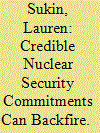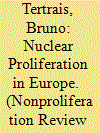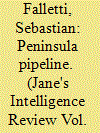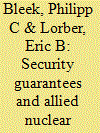| Srl | Item |
| 1 |
ID:
174720


|
|
|
|
|
| Summary/Abstract |
How does the alliance between a client state and its nuclear ally influence support for proliferation in the client? Conventional wisdom suggests that when nuclear security guarantees are not credible, support for proliferation will be high, since a domestic nuclear capability offers an alternative source of deterrence. I introduce a new theory, which posits that highly credible security guarantees can backfire by causing some individuals to fear their ally might miscalculate—either by using nuclear weapons in an unnecessary preventative attack or by precipitous escalation of a crisis or conflict. Survey experiments conducted among representative samples of South Korean citizens in 2018 and 2019 support this theory, showing that increases in the credibility of the US nuclear security guarantee lead to increased support for nuclear proliferation among South Korean respondents.
|
|
|
|
|
|
|
|
|
|
|
|
|
|
|
|
| 2 |
ID:
076718


|
|
|
|
|
| Publication |
2006.
|
| Summary/Abstract |
Proliferation in Europe stopped in the 1960s due to the nuclear guarantee given by the United States and the European integration process. These factors still apply today but emerging nuclear programs in the European Union (EU) neighborhood and the distension of the transatlantic link make the possibility of a new nuclear country in Europe not completely unthinkable. Turkey would be a prime candidate. In addition, some isolated states could go nuclear if faced with a perceived security threat. Ukraine would be the most likely case. Finally, in extreme circumstances, an EU member could consider a nuclear program. In light of such possibilities, the U.S. security guarantee to Europe, including a nuclear dimension, remains an important nonproliferation instrument
|
|
|
|
|
|
|
|
|
|
|
|
|
|
|
|
| 3 |
ID:
109844


|
|
|
| 4 |
ID:
131238


|
|
|
|
|
| Publication |
2014.
|
| Summary/Abstract |
As Iran continues its apparent pursuit of a nuclear weapons breakout capability and North Korea resists efforts to roll back its proliferation, policy makers in Washington eager to prevent further proliferation in both regions regard security guarantees to allies as crucial tools. But recent scholarship calls into question whether security guarantees ameliorate proliferation risks. Relying on a combination of large-N quantitative analysis and a case study of South Korea from the late 1960s to the mid-1980s, this article argues that, consistent with policy makers' conventional wisdom, security guarantees significantly reduce proliferation proclivity among their recipients.
|
|
|
|
|
|
|
|
|
|
|
|
|
|
|
|
| 5 |
ID:
188823


|
|
|
|
|
| Summary/Abstract |
How robust is public support for extended nuclear deterrence in patron and client states? Recent studies have improved scholarly understanding of US public opinion about nuclear weapon use against non-nuclear adversaries. Yet, there is limited knowledge of public attitudes regarding retaliation for nuclear strikes against US allies. We develop a theoretical typology of nuclear crises and investigate this phenomenon with a novel survey experiment (n = 6,623). Americans, Japanese, and South Koreans viewed realistic emergency alert messages about a most-likely case for nuclear retaliation: a North Korean missile attack on a US ally protected by the nuclear umbrella. Support for nuclear retaliation is low in all three countries, with important cross-national differences. Favorability increases with North Korean nuclear first-use, but it remains limited nonetheless. Surprisingly, US “tripwire” troop casualties do not increase Americans’ demands for nuclear retaliation. These findings have important implications for the study of nuclear crises and practice of extended deterrence.
|
|
|
|
|
|
|
|
|
|
|
|
|
|
|
|